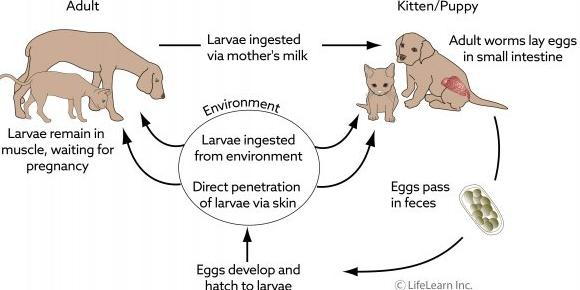
Deworming Puppies and Kittens
Roundworms and hookworms are common intestinal parasites of puppies and kittens. Puppies and kittens are often held and cuddled by young children who, like our pets, seem to be oblivious to good hygiene. Children do not wash their hands when they should. They pick things up and put them in their mouths. They kiss their pets and suck their thumbs. Whatever is on their little thumb ends up in their stomach. We often share our kitchens, bathrooms, and even our beds with our pets. Veterinarians are dedicated to helping people enjoy their pets by keeping them free from parasites and diseases that may be transmitted to family members. Dog and cat roundworms (Toxocara) and hookworms (Ancylostoma and Uncinaria), common intestinal worms of puppies and kittens, may be present in unborn puppies or spread to pups and kittens through milk during nursing. Infected puppies may start shedding eggs into the environment as early as 3 weeks of age. Kittens may start shedding eggs 2 to 3 weeks later. Roundworms have a life cycle that includes a migrating larval stage. When people ingest the worm's eggs, the eggs hatch into larvae (microscopic worm stage). The larvae then migrate through the intestinal wall and into the liver, lungs, eyes, and other tissues. There the larvae may cause physical damage and/or produce allergic-type reactions. They may travel to the eye(s) and cause partial or complete blindness or may travel to the brain and cause serious permanent nerve damage. Infected people cannot transmit these worms to other people. Hookworm larvae may be in the soil where children play. The larvae may penetrate the skin and cause skin rashes. They may also migrate deeper into tissue and invade the intestinal wall, causing a serious allergic intestinal disease called eosinophilic enteritis. These worms can cause serious illness in people and pets. At the very least, your pet's stools should be examined by your veterinarian at least every 6 months the first year, then yearly thereafter.
Important Points in Treatment
Below are recommendations of the Centers for Disease Control, the National Center for Infectious Disease, and the American Association of Veterinary Parasitologists:
1. Puppies should be dewormed at 2 to 3 weeks of age and again every 2 weeks for up to 4 dewormings. Because prenatal infection does not occur in kittens, they can be wormed at 6 weeks of age, and again at 8 and 10 weeks of age.
2. Stools less than a day old should be collected and submitted to your veterinarian for laboratory examination. Early deworming prevents heavy environmental contamination by the eggs and larvae that serve as an important source of infection for your pet and family members.
3. Medication: Be certain to give young puppies or kittens the worm medication that is
prescribed by your veterinarian. Some medications cannot be given to young pets.
